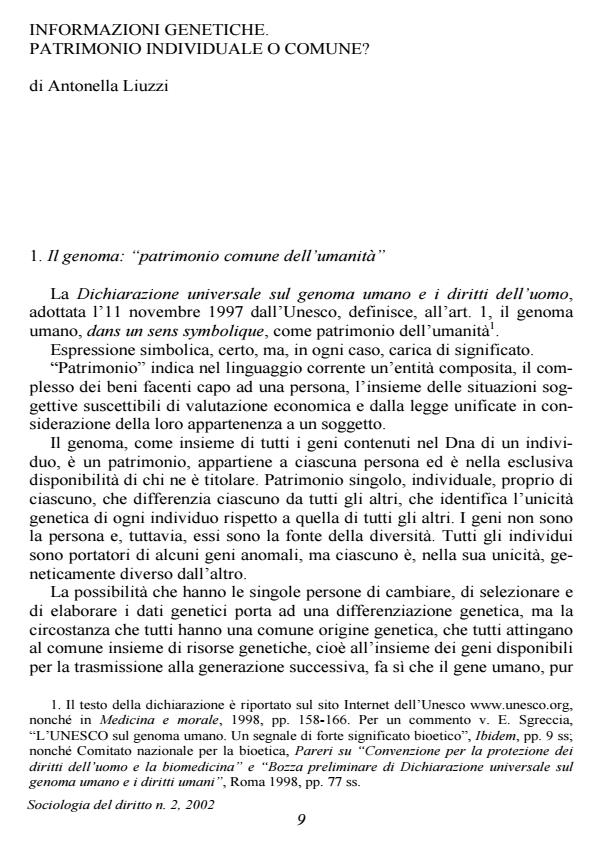Informazioni genetiche. Patrimonio individuale o comune?
Titolo Rivista SOCIOLOGIA DEL DIRITTO
Autori/Curatori Antonella Liuzzi
Anno di pubblicazione 2002 Fascicolo 2002/2 Lingua Italiano
Numero pagine 31 P. Dimensione file 155 KB
DOI
Il DOI è il codice a barre della proprietà intellettuale: per saperne di più
clicca qui
Qui sotto puoi vedere in anteprima la prima pagina di questo articolo.
Se questo articolo ti interessa, lo puoi acquistare (e scaricare in formato pdf) seguendo le facili indicazioni per acquistare il download credit. Acquista Download Credits per scaricare questo Articolo in formato PDF

FrancoAngeli è membro della Publishers International Linking Association, Inc (PILA)associazione indipendente e non profit per facilitare (attraverso i servizi tecnologici implementati da CrossRef.org) l’accesso degli studiosi ai contenuti digitali nelle pubblicazioni professionali e scientifiche
Art. 1 of the Universal Declaration on the Human Genome and Human Rights, adopted on 11 November 1997 by UNESCO, defines the human genome in a symbolic sense, as the heritage of humanity. The genome, which is the sum of all the genes contained in an individual’s DNA , is a heritage in that it belongs to each person and identifies her or his genetic uniqueness with respect to that of all others. However, the genome is also a heritage in the sense that it has a high economic value. Knowledge about it enables both an individual's life and that of society as a whole to be conditioned, as genetic tests conducted before or after a human being is born can be used to identify that person’s DNA and any genetic anomalies that may already have caused any serious illness or are likely to do so in future. Genetic tests enable the consequences that the possible development of such illnesses may generate on the political, economic and social levels to be weighed up in advance. It follows that they may also lead to discrimination against an individual in the framework of education programmes, insurance policies and job opportunities. The implication is that, in addition to its economic value, the genome is also very rele-vant for law, public policies and society as a whole, as what is typical of an indi-vidual becomes a matter of societal use. If genetic data constitute a heritage that is on the whole individual rather than common, their diffusion will affect the sphere of individuals’ fundamental rights and liberties.;
Antonella Liuzzi, Informazioni genetiche. Patrimonio individuale o comune? in "SOCIOLOGIA DEL DIRITTO " 2/2002, pp , DOI: